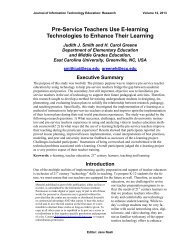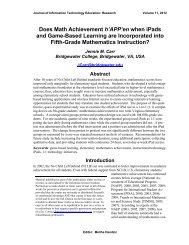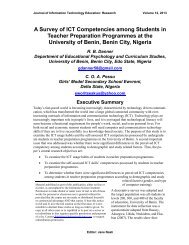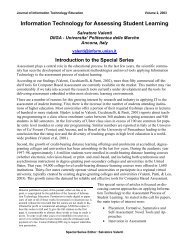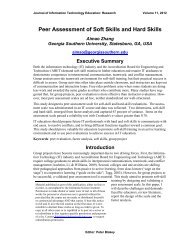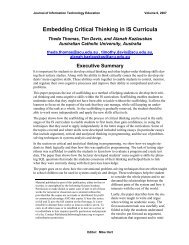Collaborative Learning in Online Study Groups - Journal of ...
Collaborative Learning in Online Study Groups - Journal of ...
Collaborative Learning in Online Study Groups - Journal of ...
Create successful ePaper yourself
Turn your PDF publications into a flip-book with our unique Google optimized e-Paper software.
<strong>Collaborative</strong> <strong>Learn<strong>in</strong>g</strong> <strong>in</strong> Onl<strong>in</strong>e <strong>Study</strong> <strong>Groups</strong>: An EGT Perspective<br />
Table 5 The pay<strong>of</strong>f matrix <strong>of</strong> a tailored 2 x 2 PD game<br />
Cooperate<br />
Defect<br />
Cooperate b+w-c w-c<br />
Defect b 0<br />
The <strong>in</strong>terpretation is as follows: a student who did not participate actively could still access the<br />
shared <strong>in</strong>formation, ideas and resources (i.e., b) posted by an active participant <strong>in</strong> the discussion<br />
board or file exchange area without need<strong>in</strong>g to bear any cost. Obviously, the non-participant<br />
would not get any mark (i.e., w) for not submitt<strong>in</strong>g his work (but he could still benefit from the<br />
<strong>in</strong>formation ga<strong>in</strong>ed for the f<strong>in</strong>al exam). The active participant would receive a reasonable mark<br />
while contribut<strong>in</strong>g (i.e., w - c), but unless the other student had actively contributed (i.e., b + w -<br />
c) he would not get anyth<strong>in</strong>g new apart from the th<strong>in</strong>gs he himself contributed. When there were<br />
no active participants between them, none <strong>of</strong> them would get anyth<strong>in</strong>g (i.e., 0).<br />
Recall that <strong>in</strong> Tasks 1 & 2, the students were required to write 1500-word reports for both tasks.<br />
Task 1 was worth only 5% <strong>of</strong> the overall mark, while Task 2 worth 20%. Similarly, <strong>in</strong> Tasks 3 &<br />
4 the students were required to write a 1500-word report and a s<strong>of</strong>tware application respectively,<br />
with the weight for the former 5% and the weight <strong>of</strong> the latter 25%. Let us assume that the cost <strong>of</strong><br />
complet<strong>in</strong>g Tasks 2 & 4 is the same as the total mark available for each <strong>of</strong> the tasks. This means<br />
most <strong>of</strong> the time the cost the students pay for do<strong>in</strong>g the tasks would exceed the mark they expect<br />
to get (i.e., c > w, s<strong>in</strong>ce hardly anyone gets full mark for report writ<strong>in</strong>g and s<strong>of</strong>tware application),<br />
and thus lands us right <strong>in</strong>to the region <strong>of</strong> a PD game with T > R > P > S. From here, it is not difficult<br />
to derive that low levels <strong>of</strong> participation would be <strong>in</strong>evitable.<br />
Based on the above understand<strong>in</strong>g, we could draw pr<strong>in</strong>ciples and f<strong>in</strong>d<strong>in</strong>gs from EGT to enhance<br />
the level <strong>of</strong> participation. Our endeavor <strong>in</strong> remix<strong>in</strong>g students <strong>of</strong> different groups between Tasks 1<br />
& 2 and Tasks 3 & 4 was one <strong>of</strong> the attempts we made <strong>in</strong> this unit. Inspired by the study by Aktipis<br />
(2011) show<strong>in</strong>g a simple “walk-away” strategy that allows <strong>in</strong>dividuals to leave their group if<br />
they cannot ga<strong>in</strong> high returns (due to too many defectors) <strong>in</strong> the exist<strong>in</strong>g group as well as other<br />
studies (Helb<strong>in</strong>g & Yu, 2008, 2009) demonstrat<strong>in</strong>g that success-driven migration can cause outbreak<br />
<strong>of</strong> cooperation, we moved active participants from Inactive groups to Active groups and<br />
comb<strong>in</strong>ed active participants from two Borderl<strong>in</strong>e groups <strong>in</strong>to one. In return, non-participants<br />
from Active groups were moved to Inactive groups to fill up the vacant places left by the “mov<strong>in</strong>g”<br />
active participants, and non-participants from Borderl<strong>in</strong>e groups were comb<strong>in</strong>ed to make up<br />
new groups.<br />
By do<strong>in</strong>g this, we were hop<strong>in</strong>g that (1) more Active groups could be formed; and (2) Inactive<br />
groups could be “revived” (e.g., when there were no active participants <strong>in</strong> the group, nonparticipants<br />
might step up to become active participants). Unfortunately, the remix<strong>in</strong>g method<br />
worked only for those who had been moved to Active groups. This was evident based on the follow<strong>in</strong>g<br />
sample comments from the “mov<strong>in</strong>g” students:<br />
"In the second half <strong>of</strong> this unit, from week 7 onwards, I have found participat<strong>in</strong>g <strong>in</strong> this group more useful<br />
that the first half. I found myself <strong>in</strong> a new group and before I could post a “hello” message I was already<br />
sent a nice welcom<strong>in</strong>g email from one <strong>of</strong> the other members who noticed I was a new member and wanted<br />
to welcome me <strong>in</strong>to the group. This greatly assisted with <strong>in</strong>teract<strong>in</strong>g with the rest <strong>of</strong> the group. Once I had<br />
been <strong>in</strong>troduced it was easy to get straight <strong>in</strong>to the collaboration."<br />
"My previous decision was to participate <strong>in</strong> the group and I have cont<strong>in</strong>ued to do so. Be<strong>in</strong>g moved to the<br />
new group has helped to make this decision. Previously, I listed the lack <strong>of</strong> participation from the previous<br />
group as a major disadvantage. After be<strong>in</strong>g moved to Support Group 6, I immediately noticed an active<br />
discussion board and believed this would help overcome a large issue <strong>of</strong> group participation."<br />
96



